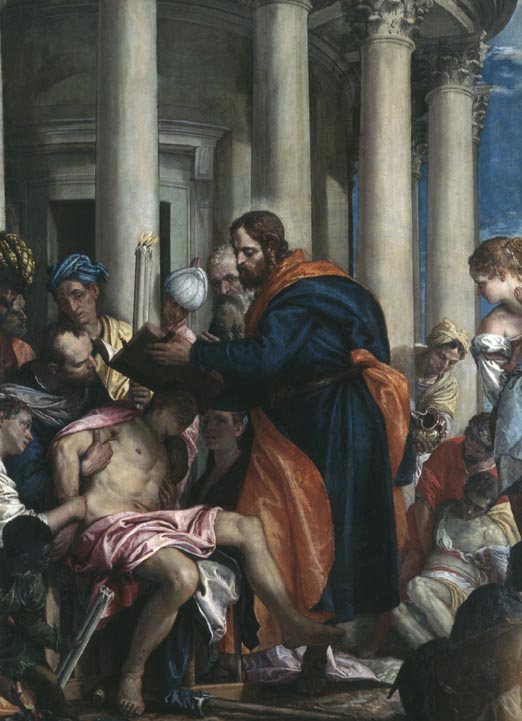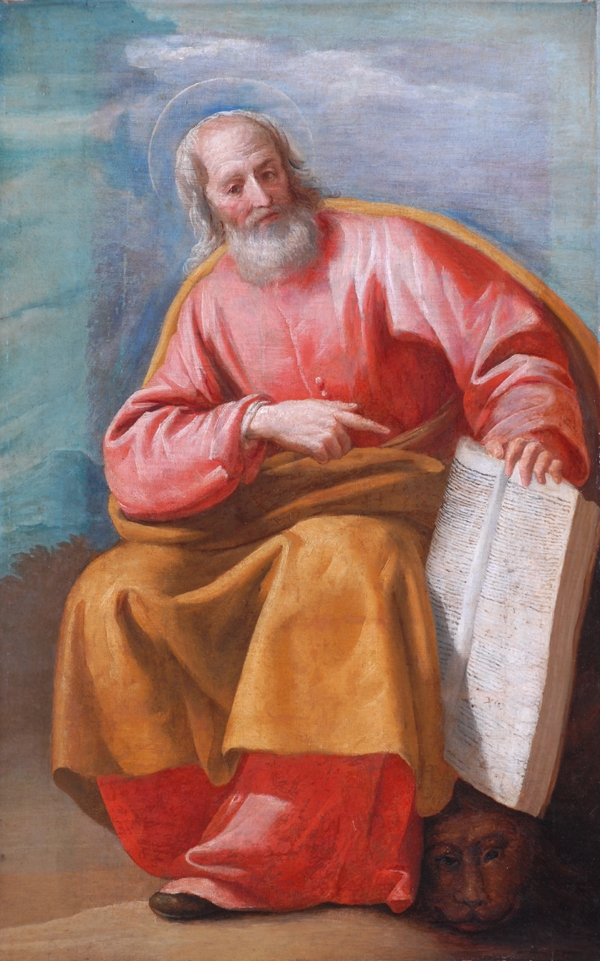Today is the Feast of St. Mark, celebrating one of the four Gospel writers. What do we know about him from the Bible?
 |
| Matthias Stom, The Evangelists Saint Mark and Saint Luke (detail) (1635) |
The place we hear the most about him is in the Book of Acts. St. Luke generally refers to him in Acts as “John, also called Mark” — John is a Jewish name, while Mark (or Marcus) is a Roman name. It’s here, in the Book of Acts, that we learn that he’s the son of a prominent Jerusalem Christian named Mary (Acts 12:12). Mark’s family appears to be wealthy. His mother’s house is large enough to serve as the meeting place for many Christians, and when Peter arrives at it, he knocks on the door of the pylōn, which Strong’s defines as “a large gate: of a palace” or “the front part of a house, into which one enters through the gate, porch.” It’s Rhoda, a servant of Mary’s, who answers the door (Acts 12:13).
Father Panula, in his homily today, pointed to an intriguing part of Mark’s Gospel, Mark 10:17-23, which appears to be autobiographical:
And as he [Jesus] was setting out on his journey, a man ran up and knelt before him, and asked him, “Good Teacher, what must I do to inherit eternal life?” And Jesus said to him, “Why do you call me good? No one is good but God alone. You know the commandments: `Do not kill, Do not commit adultery, Do not steal, Do not bear false witness, Do not defraud, Honor your father and mother.'” And he said to him, “Teacher, all these I have observed from my youth.”
And Jesus looking upon him, loved him, and said to him, “You lack one thing; go, sell what you have, and give to the poor, and you will have treasure in heaven; and come, follow me.” At that saying his countenance fell, and he went away sorrowful; for he had great possessions. And Jesus looked around and said to his disciples, “How hard it will be for those who have riches to enter the kingdom of God!”
This account appears in Matthew and Luke’s Gospels as well (Mt. 19:16-23; Lk. 18:18-24), but Mark includes a unique detail: that Jesus looked upon the man, and loved him. The intimacy of this detail, coupled with the fact that we know Mark was a rich young man, makes it likely that the man was Mark himself. Later, after telling of Jesus’ arrest in the Garden of Gethsemane, Mark adds (Mark 14:51-52),
A young man, wearing nothing but a linen garment, was following Jesus. When they seized him, he fled naked, leaving his garment behind.
Again, Mark’s is the only Gospel to mention this detail, and again, it’s probably autobiographical. In fact, it appears to be the main reason to include this detail at all.
 |
| Paolo Veronese, Barnabas Curing the Sick (1566) |
After the Resurrection, St. Peter comes to his mother’s house (Acts 12:12-19), as I mentioned above. Some time later, Mark joins St. Paul and St. Barnabas on their mission (Acts 12:25), and Acts 13:5 explains that he was there “to assist them.” However, in Pamphylia, he deserted them, and went back to Jerusalem (Acts 13:13). St. Mark gets back up from this third abandonment, but it causes some lingering damage, particularly to the relationship between Paul and Barnabas (Acts 15:36-40):
And after some days Paul said to Barnabas, “Come, let us return and visit the brethren in every city where we proclaimed the word of the Lord, and see how they are.” And Barnabas wanted to take with them John called Mark.
But Paul thought best not to take with them one who had withdrawn from them in Pamphyl’ia, and had not gone with them to the work. And there arose a sharp contention, so that they separated from each other; Barnabas took Mark with him and sailed away to Cyprus, but Paul chose Silas and departed, being commended by the brethren to the grace of the Lord.
In Colossians 4:10, St. Paul mentions an Evangelizer named Mark that he describes as Barnabas’ cousin, and it’s probably the same Mark. Certainly, this might explain why the dispute over whether or not to bring Mark along would be of such importance to Barnabas and Paul. It’s while accompanying Barnabas that Mark founds the Church at Alexandria, one of the greatest of the early Christian churches.
 |
| Jusepe Leonardo, Saint Mark (1630) |

Great post. As one who admittedly struggles with “cowardice in the faith” I find inspiration reading this today!
Lovely post on my son Mark’s feast day!
Dear mr. Joe Heschmeyer,
I’m Fernando Silveira, a Brazilian theologian (I studied spiritual theology). I have been a reader of your blog for some years
Sorry for my poor English expression.
I’m writing to ask your help: In a reunion with other theologians I stated that there are some solid theological reasons to the reality that only men can be ordained. I felt that I was a lamb in the middle of lions. I was eaten alive and accused of almost everything: misogynous; archaic; etc.
Could you, please — please! — present me some arguments that support the reality that there are solid theological reasons to the male priesthood only?
They do not accept Jesus’ choice: they say that this is only a cultural reality that can be changed;
They do not accept the magisterium tradition;
They do not accept John Paul II’s opinion expressed in “Ordinatio Sacerdotalis” saying that this can be changed;
What can I say?
yours in Christ,
—
Fernando Jesus Scheper da Silva Silveira
This comment has been removed by the author.
Daniel,
I think you mean well, but what you have said here is rather erroneous and does not seem to be helpful to anyone. In fact, it is possible that someone reading that comment would only have confirmed or be scared away from the Church if they are seeking for a real answer.
Keep in mind, we do have females who have to (or should) confess sexual sins to a male priest. And the once a month comment is rather childish. I wish I had another mode of correcting you other than publicly, but I find it more charitable to do so both for yourself and for other readers than to just let that go. There are plenty of good reasons for the male only priesthood so let’s try to stick to those.
Fernando,
Have you read mulieris dignitatem by JPII? It seems you probably have, if not it’s worth a shot. I am dealing with the same issue with a close friend and it has been helpful, if nothing else than to clear up the Churches high view of women which stands in stark contrast to what the world tells us the Church thinks about women.
In Christ
Cary
Also the book Women and the Priesthood by Peter Kreeft and Alice Von Hildebrand is very much worth reading. There is a chapter from it available online:
http://www.peterkreeft.com/topics-more/sexual-symbolism.htm
Fernando, there are very many valid theological and cultural reasons why only Men are Ordained to be Priests in the Catholic Church. Firstly, the Sacrament of the Eucharist, is the re-enactment of Jesus’Sacrifice to His Father – in perpetuity – for the redemption of mankind. This Sacrifice, Jesus offered during the Last Supper in the Upper Room when, He prayed over the Bread and Wine, turned them into His Own Body and Blood and then gave the first Holy Communion to His Apostles. In His Revelation to St. Faustina, His Secretary of the Eucharistic Apostolate of the Divine Mercy, she writes: …Jesus raised His eyes to Heaven and entered into a mysterious conversation with His Father…..At the moment of Consecration love rested satiated – the Sacrifice fully consummated. Now only the external ceremony of death will be carried out – the external destruction” on Calvary the following day.(“Divine Mercy in My Soul” St. Faustina’s Diary No.684) The Church rightly teaches that at the time of Consecration, it is Jesus Himself – represented by the Priest – who offers Himself to the Father, and turns the Bread and Wine into His Own Body and Blood. Consequently, a woman cannot take the place of Jesus Christ. Remember also, when Jesus appeared to His Apostles on the 8th Day and Ordained them by breathing into the the Holy Spirit, he gave them His Powers to forgive sins and instituted the Sacrament of Reconciliation (Penance). During that Ordination Ceremony, His own Mother was absent. Finally, in all religions and cultures of the world, whenever a Sacrifice is offered to God the Creator, it is always offered by a man. Never a woman. The Catholic Church teaches and holds fast that She does not have any Authority from Jesus to ordain women to be Priests. And this Teaching shall never change until Christ comes back at the End of Time
Great commentary. I always believed that Mark wrote his Gospel when he was in his 20s not like tradition says he was like 70 when he wrote it. Makes more sense if he was still very young when he was a prominent helper, interpreter, writer and minister. Makes sense because Mark was young rich and highly educated by the evidence expressed in the Gospels and the Acts. The way he is portrayed up to 65AD when Peter wrote his first letter from Rome Mark seems to be at least 20 years younger than Peter because Peter calls him “son” . Marks seems to be in his early 40s, single and very capable writer in 65 AD. Mark was a good helper for Peter who at 66 years old might not had the good eye sight he used to have 30 years earlier as a fisherman. Mark was rich, single, young, physically fit, highly educated and maybe a little full of himself because he grew up with a silver spoon in is mouth. Mark was half Roman Half Jew and probably of olive skin attractive young fella with short hair looking like a Roman or Greek. Capable of speaking and writing in Greek, Hebrew and Latin. Then Barnabas seems to be his uncle not his cousin. Barnabas seems to be way older and mature than Mark. Mark’s mother Mary could have been Barnabas’s sister. A very wealthy family from Cyprus.
Let’s take a look at Mark’s time line: He was about 14 when he ran naked from the Garden of Gethsemane. His own relation states a “young man” meaning a teenager younger than the apostle John who was around 18 at the time. He was clothed with a “lien cloth” which was a rich peace of sleeping garment for rich Roman-Jew boys.
When Peter escaped from Prison Luke seems to put emphasis in Mark not his mother. “The house of Mary , Mother of John with surname Mark” implying that by 40AD Mark was already well known in the community at the age of 23. Maybe because of his intellect, his money or something!
Then in 65 AD when Peter wrote his first letter from Rome Peter calls Mark his son implying Mark was at least 15-20 years younger than him. Let’s say 45. In his second Letter in 66 AD Peter does not mentions Mark who might have gone to North Africa. Peter is with Silas(Silvanus), Lino, Clement, Claudia and other Roman Christians. By this year Peter was martyred at the age of 67. John the apostle who was like 56 was already in Ephesus. Then Tradition takes it from there saying that Mark died a martyr at the age of 70 in Alexandria, Egypt in 80AD..